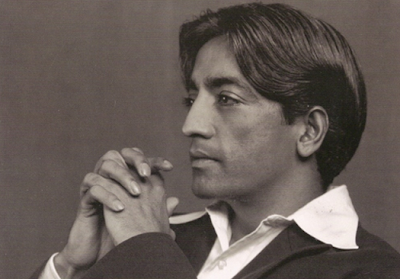meditation 15

Listen . . .
with one-pointed attention
to the continuous sound –
arising from within –
which is not an effect
of any cause . . .

or . . . listen
to the continuous sound
of a fast-flowing river . . .
Thus bathing
in the great sound
of Brahma . . .
you attain Brahma
(the Absolute).
▼▼⛛▼⛛▼▼
Notes:
Continuous sound attunes our awareness to the subtle, luminous, divine hum of divinity: that which arises within the region where One emerges into many, thus unveiling the mechanics of creation.
First, please refer to Swami Lakshmanjoo's commentary on this verse in his Manual for Self Realization (John Hughes, ed.).

Ψ
Next, for the portion of the verse directing one to attend to the sound of a river, please enjoy translator Pandit Dina Nath Muju's profoundly innocent short story based on this verse, "The Eternal Throb."
The reading will open to you a sense of this translator's heart and mind, the translator Swamiji chose to collaborate with on this translation.

One thing you may have noticed in your reading of Panditji's story is his use of the word choiceless, that gentle quality of effortless, innocent awareness that the river teaches both to the old man beside the river and to the story's young protagonist.
Panditji was friends with J. Krishnamurti, who used the phrase choiceless awareness in many of his talks. This fact, also, may also provide you with some insight into Panditji's heart and mind.
Ψ
The following facts about Panditji's relationship to Krishnamurti are paraphrased from his memorial publication Drops of Nectar.
Panditji would make friends by sharing his views about Krishnamurti with people around him. Of course, with Srinagar being the place of Panditji's residence, he even extended his circle so far as Krishnamurti was concerned, to Kanpur, where he used to go every year, as well as Bombay, Madras, and Varanasi. Even at Acchabal Anantaag Kashmir, where he would go to stay with his youngest son, who worked in the State Sericulture Department, he enjoyed staying at Rama Krishna Mission Ashram, Nagdandi, Achhabal and made good friends with the locals.
While Krishnamurti continued to be his spiritual mentor, Panditji simultaneously developed his contacts with Swami Laxman Joo, the highly evolved soul, saint, and famous scholar of Saivism who was most probably Panditji's schoolmate as well.
Swami Laxman Joo had an Ashram at Ishbar, Nishat, Srinagar. He would conduct classes in Shaivism there. Pandit Dinanath Ji developed a great interest in Saivism and started attending Swami Ji’s classes on every Sunday, or as per a programme drawn by Swamiji himself. Swamiji too developed great love and affection for Pandit Dinanathji and had at times remarked that if anybody in the class understood Shaivism it was only Dinanath Ji.
This was perhaps because of the great similarity between Shaivism and the teachings of J. Krishnamurti, who used to address Panditji as Dinanath Ji whenever they would meet.
Pandit Muju's religious bent of mind and the teachings of Theosophy and Krishnamurti had given a complete philosophical orientation to his personality. He used to go into long durations of aloofness and meditation. He did not mediate in the ritualistic sense. His was always attempting to look inwards. His home people fondly remember Tathaji's wakeful sleeping postures, when he would in fact be meditating.
Dinanathji's quest for knowledge and truth brought him into contact with students of Shaivism, and he landed at the Ashram of Swami Lakshman Ji Maharaj of Ishbar, Nishat. Swami Lakshman Ji was immensely impressed by Mr. Muju's scholarship and his association with Krishnamurti. Influenced by the spirituality and knowledge possessed by Swami Ji, Mr. Muju found much common ground between Shaivism and Krishmurti's teachings.
Every event of Shri J. Krishnamurti’s life had an impact on Muju Sahib. Though he had his roots in tradition, yet he was deeply influenced by the declaration of J. Krishnamurti that “Truth is a pathless land."
J. Krishnamurti spent his whole life spreading his teachings to all types of people, across the different continents of the world. He had great faith in education. He believed that new civilisation and new society should be based on the new set of values, free of competition, corruption, violence and greed.
Pandit Muju tried to live Krishnamurti in his everyday life and helped many people live their lives likewise. For instance, he hated idle gossip—if anybody spoke anything against any person he would politely tell him to desist from such actions.
Ψ
Krishnamurti would come each spring to speak in the oak grove near my home of forty-four years in Montecito, California.
Here Krishnamurti speaks on choiceless awareness.

Ψ
As for the phrase in this verse mentioning uncaused continuous sound, the following are pertinent:
The Ekakshara Upanishad (Sanskrit: एकाक्षर उपनिषत्; IAST: Ekākshara Upaniṣat), also titled Ekaksharopanishad (Sanskrit: एकाक्षरोपनिषत्), is a minor Upanishadic text of Hinduism written in Sanskrit language. It is attached to the Krishna Yajurveda, and is a Samanya (general) Upanishad.[2]
The Upanishad discusses Om (Pranava) as the Ultimate Reality Brahman, equating it to the imperishable truth and sound, the source of the universe, the Uma, the Shiva, the Narayana, the Atman (soul) that resides in one's heart.[3][4][5]

The one immortal syllable (Ekakshara), is described in the text as the Hiranyagarbha (the golden fetus, the sun, Brahma), the manifested universe, as well as the guardian of the universe.[4][6]
History
Ekakshara, literally "the one syllable," refers to Om of Hinduism.[1][7] It refers to the primordial sound, the seed, the source of the empirically observed universe, representing the totality of manifested changing cosmos and the unchanging supreme reality Brahman.[1]
The term Upanishad means it is knowledge or "hidden doctrine" text that belongs to the corpus of Vedanta literature collection presenting the philosophical concepts of Hinduism and considered the highest purpose of its scripture, the Vedas.[8]
Manuscripts of this text are also found titled as Ekaksaropanisad.[4][9] In the Telugu language anthology of 108 Upanishads of the Muktika canon, narrated by Rama to Hanuman, it is listed at number 69.[10]
Contents
This Upanishad, presented in 13 verses, is dedicated to Ekaksara.[4] The Ekaksara is a compound of Ek (one) and Aksara (syllable), or the imperishable syllable in Hindu tradition, the Om.[11] The text follows the Sabda-brahman tradition. One of the earliest mentions of Ekaksara as OM, the cosmic sound, it being Brahman and the source of the universe, is found in verses 6.22-6.23 of the Maitri Upanishad, as well as in the Brahmana layer of the Vedic literature.[12]
The imperishable
The text opens declaring Om the Ekakshara as the one imperishable, it is Sushumna (kindest core), it is all that is here, that which is unchanging firm, the primordial source of all, the one that created water wherein life arose, the protector, the only one.[13][14] The verses 2 and 3 of the Upanishad state that the Ekakshara is the ancient unborn, and the first born therefrom, the immanent truth, the transcendental reality, the one who sacrifices all the time, the fire, the always omnipresent, the principle behind life, the manifested world, the womb, the child from the womb, the cause, and the cause of the causes.[13][14]

The text asserts that it is the Ekakshara that created the Surya (sun), the Hiranyagarbha the golden womb of everything, the manifested cosmos, the Kumara, the Arishtanemi, the source of the thunderbolt, the leader of all beings.[15] It is the Kama (love) in all beings, states the Upanishad, it is the Soma, the Svaha, the Svadha, the Rudra without suffering in the heart of all beings.[13][14]
The eternal
Ekakshara is that which is all pervading, the divine, the bliss of aloneness, the one eternal support, the cleanser, the past of everything, the present of everything and the future of everything, the imperishable syllable, asserts the text. Verse 7 states that the Rigvedic hymns, the songs of Samaveda, the formulas of Yajur, originate in this cosmic syllable, it is all knowledge, it is all sacrifice, it is the purpose of all striving.[16][14] It dispels the darkness, it is the light in which the Devas dwell, it is all knowledge, it is that what is the fulcrum of all beings, it is pure truth, it is that which isn't born, it is sum total of everything, it is what the Vedas sing, it is the Brahman that the knowers know.[14]
The one in every being
Om, the Ekakshara, is every man, every woman, every boy, every girl, states the Upanishad.[17][18] It is the king Varuna, the Mitra, Garuda, Chandrama (moon), Indra, Rudra, Tvastr, Vishnu, Savitr, the earth, the atmosphere, the land, the water, the womb of all that is born, that which envelops the world, and the self-born states the text. It is the protector Vishnu, who guides away from what is wrong. It, states the Upanishad in verse 13, is wisdom, is the aim of those who seek wisdom, that which is in the heart of every being, the eternal dwelling innermost self, the golden truth.[19][14] Thus ends the Upanishad.[20]
Source: Wikipedia
Ψ
Herein, within the realm of this primordial, unborn vibration, divine perception dawns.
Herein the mechanics of creation unfold.
Herein the One creates the many.
Om is where the art is.

